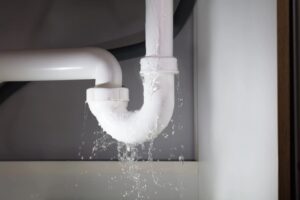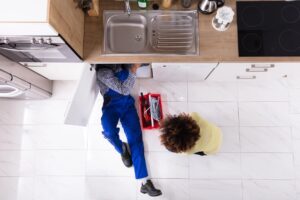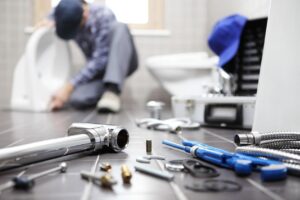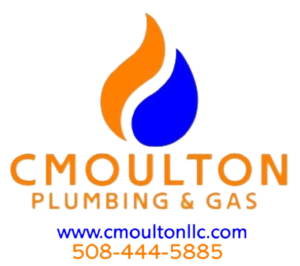For homeowners, understanding the basics of how this system works can help you identify issues early, perform simple maintenance tasks, and communicate more effectively with professional plumbers when necessary. This guide will provide an overview of the essential components and functions of your home’s plumbing system.
Understanding your home’s plumbing system is important, and easy when broken down the right way. In a nutshell, it’s a network of pipes, fixtures, and appliances designed to supply clean water and remove wastewater. It can be divided into two main subsystems: the water supply system and the drainage system.
The water supply system brings fresh water into your home, distributing it to various fixtures and appliances. This system is under pressure to ensure water flows efficiently through the pipes. Key components include:
The drainage system removes wastewater from your home, ensuring it is safely transported to a sewer line or septic system. Unlike the water supply system, the drainage system relies on gravity to move wastewater. Key components include:
Understanding your plumbing system will help diagnose common issues as they arise and can help you take proactive steps to prevent or address them. Here are a few typical problems and how to handle them:

Cause: Worn-out washers or seals. Solution: Replace the washer or seal. If you’re unsure how to do this, consult a professional plumber.
Cause: Accumulation of hair, grease, soap scum, or foreign objects. Solution: Use a plunger or a plumber’s snake to clear the clog. For persistent issues, avoid chemical drain cleaners as they can damage pipes; instead, contact a plumber.
Cause: Faulty flapper valve or fill valve. Solution: Replace the faulty valve or adjust the chain connecting the flapper to the flush handle. If the problem persists, consult a plumber.
Cause: Mineral buildup in pipes, leaks, or issues with the municipal water supply. Solution: Clean faucet aerators and showerheads to remove mineral buildup. Check for visible leaks and contact a plumber to inspect and resolve any hidden leaks or pressure issues.
Cause: Sediment buildup, faulty thermostat, or worn-out heating element. Solution: Drain the water heater to remove sediment buildup and test the thermostat and heating element. For complex issues, hire a professional plumber.

Part of understanding your plumbing system is knowing the basics of regular maintenance. Regardless of whether you perform the maintenance yourself, or you call a plumbing company like us, this is good info to have if you’re in a pinch and can help prevent plumbing issues and extend the life of your system. Here are some tips to keep your plumbing in top condition:
Regularly check for leaks under sinks, around toilets, and near appliances. Address any leaks promptly to prevent water damage and mold growth.
Avoid pouring grease, coffee grounds, and large food particles down the drain. Use drain covers to catch hair and debris, and clean them regularly.
Drain your water heater annually to remove sediment buildup. Set the thermostat to 120°F to prevent scalding and improve energy efficiency.
If your home has a sump pump, test it regularly to ensure it’s functioning correctly, especially before the rainy season. Pour a bucket of water into the sump pit to trigger the pump.
Familiarize yourself with the location of shut-off valves for your water main, toilets, sinks, and appliances. In case of a leak or emergency, you can quickly turn off the water supply.

While some plumbing tasks can be handled by homeowners, others require the expertise of a professional plumber. Here are a few scenarios where it’s best to call in the experts:

Understanding your home’s plumbing system is essential for maintaining its functionality and addressing issues promptly. By familiarizing yourself with the basics of your water supply and drainage systems, performing regular maintenance, and knowing when to call a professional, you can keep your plumbing in excellent condition and avoid costly repairs. For homeowners, especially those on Cape Cod, having a reliable plumbing service on hand is invaluable. Contact us today for all your plumbing needs, from routine maintenance to emergency repairs, and ensure your home’s plumbing system remains in top shape.
Help us grow our Facebook and like and leave us a review if you’ve experienced our service, and keep your eyes open for more helpful tips!
https://www.facebook.com/people/CMoulton-Plumbing-Gas/61557656643874/
Call, text, email, or fill out our service request to schedule an appointment with us today!
508-444-5885
info@cmoultonplumbingandgas.com